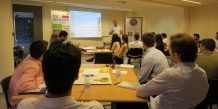Companies in the ‘traditional’ industries (energy, petrochemical, chemicals and plastics) talk of a ‘War for Talent’. Competition to attract the best of the best technology graduates is tougher than ever before. ‘Retaining Generation C’, a study of over five hundred 18-30 year olds and two hundred and fifty industry managers by the European Institute for Industrial Leadership, found that today’s young talents have an expectation of a working environment very different from that into which most of today’s managers were recruited. And if today’s managers can’t adapt to meet their expectations, then retaining the best of the best will be even tougher.
Generation C, the Connected Generation, those entering university today who have grown up with a life-time of internet connectivity, are an ‘entitled’ generation (their own view as well as mine). They want to feel valued at work; they want to have responsibility early for meaningful work, and they expect to quickly produce great results for which they will get positive recognition. They’ll expect to collaborate in their own way, making extensive use of social media to help them create and access networks and find ways around company hierarchies to make themselves heard.
So throughout a year’s programme of EIIL workshops, designed to help engineers and managers with 5 to 10 years industry experience develop their leadership skills, we introduced Gen C ‘wild-cards’ – university students without any industry experience. We tasked the combined group with a moderately complex business challenge, where experience would be an advantage. At intervals we reviewed how well the Gen C team members felt, and demonstrated, that they were integrated into the team, and what had been said, or done, and by whom which had contributed to this.
So which did we feel were the behaviours most likely, or most frequently demonstrated, to make our Generation C ‘wild cards’ feel most integrated into the team, and best able to contribute to the team’s assignment ? With some extrapolation from workshop to workplace we followed up with informal, mixed group, discussions to find out what our Gen Cs felt would turn them on or off once they got to work. I hope you find our findings helpful.
Make them feel valued early – give them frequent (near-constant) recognition and appreciation. One of the most effective integration behaviours by Seniors was to actively seek Gen C’s contributions, views and opinions in early team discussions; to make them feel valued. This helps them to raise their own perceived status above that of ‘Junior’ and into that of ‘team member’ or ‘equal’. Give them meaningful work. Gen C feel more integrated when they understand the task and feel able to contribute. But it’s not sufficient to understand just their own Task – this doesn’t become ‘meaningful’ until they can see the big picture: how it fits into the team (or department, section or project) plans, and how it ultimately contributes to the assignment (or business). Moreover, meaningful work should also help them build experience fast, and provide status (more recognition) within the workplace. Asked to repeat more of the same was a quick ‘dis-integrator’.
Help them to learn through their own experiences – a fact-based review, with specific observations, is good practice whichever generation. Start by helping them to review what has gone well in their assignment; what they did which helped them to achieve what they set out to achieve. When they feel good, confident that they can repeat these success-drivers in the future, move only then to review, again factually, what has not happened as planned, and what the causes were of this. Then help them to work out what to do in similar circumstances if they meet them again, or what they can do to avoid ever meeting them again.
When dealing with our Gen C ‘wild cards’ experienced managers found they often needed to adjust their, and their team’s, tolerance of failure. Gen Cs need to be encouraged to ‘fail’ in a protected environment. Their own social media culture only recognizes ‘like’ or ‘no comment’ and they are not used to being told they have done wrong (are ‘not liked’). For Gen C to develop to take initiatives, take responsibility and take appropriate risks, may be a long process. They’ll need to be challenged, but not too challenged that they feel exposed (and at risk of losing status). More frequent reviews of even the most mundane early tasks can start to introduce that they may be doing things less well than they thought. Helping them to open themselves up to this possibility, and that someone in the team might be able to help them with a better way, needs to be handled with extreme sensitivity if they are to hear ‘learning’ and not ‘criticism’.
Encourage them to engage with experienced colleagues – we’ve found evidence to support the view that ‘Gen C believes it can access the best of the best advice from the internet’, whereas much of the experience of colleagues in the next cubicle or office has not yet made it up there. Our Gen Cs needed to learn that real people both within and outside their team (in the workplace extend this to the direct hierarchy) often have useful knowledge which they are, usually, willing to share. Creative problem solvers they may pride themselves on being, but Gen C’s tendency to reinvent wheels rather than risk losing face by asking, made them often less efficient than they could have been. So to access knowledge quickly, Gen Cs need to build networks of ‘experts’ and influencers. Today’s ‘knowers’ need to help them by making themselves visible and accessible, and to work on the fact that they can often appear scarily unapproachable.
Make better use of social media tools – we saw three benefits from encouraging Gen C to use social media tools throughout the day for collaboration with networks both inside and outside the workshop. Firstly, it is what they are used to. They expect it to be available. Our experience found that its absence causes dissatisfaction. In the workplace, we were told, this would lead to retention problems. Secondly, they are very good at it. If we accept that we could all benefit from better remote team-working through more effective use of social media tools, then Gen C represent a valuable means of upskilling your whole workforce. We experienced instances of reverse-, or bi-directional, mentoring, where Gen Cs helped willing-to-learn Seniors with their understanding of social media collaborative technology whilst seeking knowledge from them as more experienced in the industrial aspects of the assignment. It was evident that this helped to enhance the (self-perceived) status of the Gen Cs encouraging them to engage more readily later with senior colleagues.
Our discussions highlighted a third benefit from increased use of social media, the potential to provide a means of direct communication to and from the executive floor – ‘a voice’, apparently, another ‘must have’ for Gen C – whilst giving the Executive a means to communicate directly without the filters of the hierarchy. This will take further adjustment by today’s managers to accept that Juniors might receive the same top down communications as they do themselves. That they might also respond, contributing their ideas directly (and again unfiltered) to the top, will make many managers uncomfortable.
We’ve sensitized a few future leaders to the impact their own behaviours have had on willing and enthusiastic Gen Cs, and there’s no doubt we would have lost a few had they been real recruits. Against increasing competition industrial companies will have to work hard to retain the Gen C talent that they do recruit. Active retention policies need to focus now on developing their current workplace leaders, their middle managers, to help them adapt their behaviours to the expectations of Gen C; to create the culture which will help to retain their best young talent.

